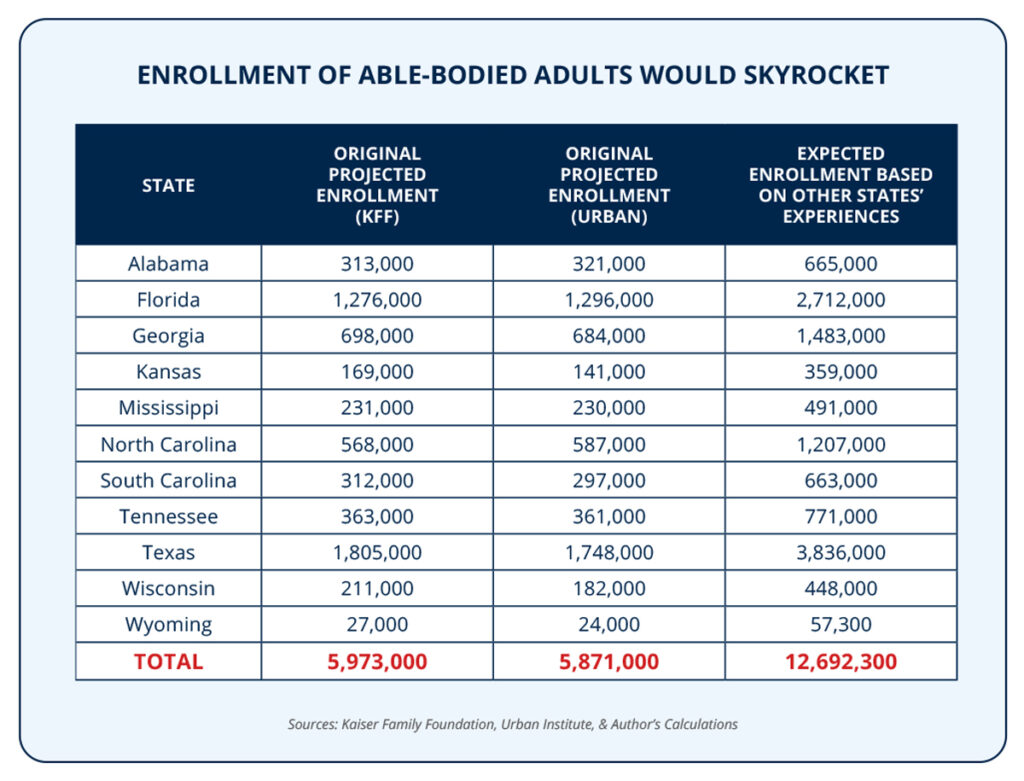New Year, Same Medicaid Expansion Failures
- BY FGA
Several states made it through another year of pressure from the federal government and leftist activists and prudently continued to decline to expand Medicaid under ObamaCare.
Now it’s 2024, and the fight continues. The bait may change, and the pressure may grow, but year after year the evidence proves that the expansion holdout states are making the right decision.
Here’s why states should continue to hold strong against expansion in the new year:
It does nothing for the truly needy—except push them to the back of the line
Advocates for Medicaid expansion like to paint a pretty picture of how expansion supposedly saves lives and serves the needy, with little evidence to back it up. Expansion won’t help a single person who is truly needy, such as people with disabilities, the elderly, low-income children, etc. Instead, it pushes those vulnerable groups to the back of the line to make way for able-bodied adults—many of whom already have private insurance through work or receive federal premium subsidies through the federal exchange.
Enrollment predictions are always wrong
And by wrong, we mean off by tens of millions. In every single state that took the bait and expanded Medicaid, actual enrollment numbers vastly exceeded the modest predictions peddled to them by leftist activists and the Biden and Obama administrations.
When expansion first started, it was estimated by “experts” that only 6.5 million able-bodied adults would ever enroll.
In reality, opening the floodgates to able-bodied adults led to an actual enrollment of 19 million people. 2023 saw Medicaid enrollment surpass 100 million people!
Here’s what holdout states could experience if they decided to expand:

Expansion is really, really expensive
With nearly one-third of the country now on Medicaid, costs of Medicaid are through the roof. Despite a modest prediction from the U.S. Department of Health and Human Services back in 2012 that the impending expansion would cost $3,200 per person, by 2018 that true cost became $6,100 per person—nearly double! Since 2018, enrollment (and the cost) has only grown.
If the remaining states expanded, taxpayers could be on the hook for nearly $800 bill in costs over the next decade.
Medicaid expansion won’t improve health outcomes, and hospitals may close
The reimbursement rate for the care of patients on Medicaid compared to patients with private insurance is significantly lower. Often, it’s below the actual cost of care. This becomes a problem for hospitals, which face significant financial issues with a flood of new able-bodied adults on Medicaid. In Montana, hospitals saw a collective 40 percent decline in their profit margin during the first full year of Medicaid expansion.
The result across the country? Closures, especially of rural hospitals. Thousands of promised hospital jobs turned into substantial job losses. And expansion hasn’t improved health outcomes—it’s made America’s drug crisis worse.
Bottom line
Medicaid expansion is a disaster. Protecting patients, hospitals, jobs, and other state priorities requires strong backbones from the states that haven’t yet expanded—and additional courage for states considering rolling back expansion.
